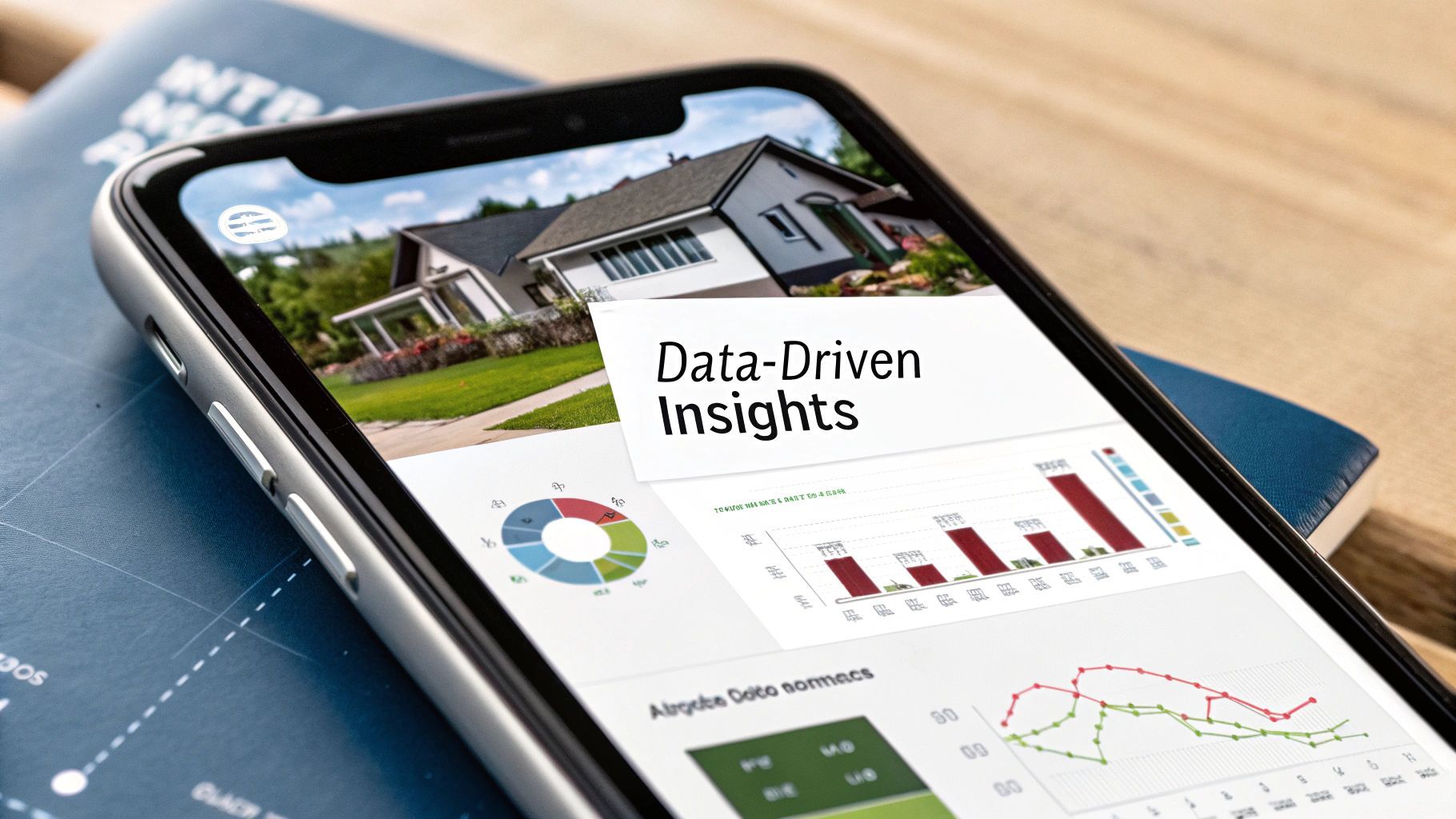The Ultimate Guide to Real Estate Deal Management Software: Transforming Property Transactions
The Ultimate Guide to Real Estate Deal Management Software: Transforming Property Transactions
Discover proven strategies for implementing real estate deal management software that drives measurable results. Learn from industry leaders about features, implementation approaches, and best practices that streamline transactions and boost ROI.
Domingo Valadez
Feb 1, 2025
Blog
Understanding the Digital Revolution in Real Estate
The real estate industry is shifting away from its traditional reliance on paperwork and manual processes. Deal management software is becoming essential for modern real estate operations - helping professionals work more efficiently and focus on what matters most: building relationships and closing deals.
Why Traditional Methods Are No Longer Sufficient
Managing real estate deals through spreadsheets, scattered emails, and paper documents creates major challenges. Simple mistakes like misplacing documents or delayed client follow-ups can derail a transaction's timeline. When juggling multiple deals simultaneously, it becomes nearly impossible to track all the moving pieces effectively using manual methods. These inefficiencies often result in missed opportunities and can damage both revenue and reputation.
The Rise of Real Estate Deal Management Software
Modern deal management platforms provide a central hub for managing every aspect of real estate transactions. Key features include automated workflows, digital document storage, built-in communication tools, and detailed reporting. Teams can access critical deal information in real-time, make faster decisions, and collaborate seamlessly.
The impact of these digital solutions is reflected in market growth. According to research, the global real estate software market reached USD 10.24 billion in 2022 and is set to grow at 12.8% annually through 2030. CRM software, which is crucial for deal management, already makes up 27.20% of the market. For more details, see the full report from Grand View Research.
The Competitive Edge of Digital Transformation
Companies that adopt deal management software gain several key advantages. The platforms speed up transaction timelines by streamlining workflows and eliminating bottlenecks. Digital tools also reduce errors through automated data management and reporting. Most importantly, better communication features help build stronger relationships with clients and team members. Real estate professionals who embrace these solutions are better positioned to succeed as the industry continues to evolve.
Essential Features That Drive Deal Success

Modern real estate deal management software helps teams execute transactions more effectively by offering key features that improve every step of the process. These tools go beyond just digitizing paperwork - they fundamentally change how deals get done, making it easier to track progress and analyze performance.
Automated Workflows for Enhanced Efficiency
One of the biggest advantages of deal management software is its ability to handle routine tasks automatically. The system can generate reports, send reminders, and manage compliance documents without manual intervention. This frees up real estate professionals to focus on what matters most - building client relationships and finding new opportunities. For instance, automated email updates keep clients informed throughout the deal, creating a more positive experience.
Smart Document Management for Seamless Collaboration
Real estate deals involve many documents, from contracts and disclosures to inspection reports. Deal management software provides a secure central hub where all files are stored and accessible to authorized parties. This prevents lost paperwork and makes collaboration simple. With built-in version control, everyone works from the latest documents, reducing errors and delays. Teams can easily share files with clients and other stakeholders, leading to faster decisions and greater transparency.
Integrated Communication to Keep Everyone Aligned
Clear communication is critical for deal success. Modern deal platforms include messaging tools, automated notifications, and video conferencing capabilities that help keep all parties on the same page. Having one central place for communication eliminates endless email chains and phone tag. It also creates an audit trail that's valuable for compliance and resolving any disputes. Dealpath, for example, helps real estate investors by bringing together data, automating manual work, and maintaining security standards. This coordinated approach means deals close faster with fewer mistakes.
Advanced Technology for Better Real Estate Deals

Modern real estate deal management goes far beyond basic digital paperwork. Today's software combines data analytics, automation, and smart technologies to help professionals close more deals successfully. The right tools provide deeper insights that drive smarter decision-making throughout the deal process.
AI-Powered Analytics for Better Decisions
Artificial intelligence (AI) and machine learning (ML) are changing how real estate professionals evaluate opportunities. These technologies can quickly analyze extensive datasets to spot key patterns and trends that humans might overlook. For instance, AI systems can process historical market data, property details, and demographic information to create accurate forecasts of property values and potential rental income. This data-driven approach helps investors make more confident decisions while reducing their risk exposure.
Faster Due Diligence Through Machine Learning
The due diligence phase is essential but often lengthy. Machine learning significantly speeds up this critical step by automating document reviews, legal checks, and risk assessments. The software learns from each deal it processes, becoming more accurate and efficient over time. This means real estate teams can complete thorough due diligence faster while catching potential issues early. The result is quicker deal closings with fewer surprises.
Using Predictive Models to Assess Risk
Data-driven predictive models help real estate professionals spot both opportunities and potential problems before they emerge. These tools analyze historical trends to forecast market changes, estimate maintenance costs, and identify properties likely to gain value. By highlighting risks early, investors can take steps to protect their interests and optimize their strategy for each deal.
The growth numbers reflect how important these technologies have become. The U.S. real estate software market reached $2.45 billion in 2022 and is growing at 10.3% annually through 2030. Deal management tools, especially CRM systems, make up a significant 27.3% share of this market according to Grand View Research. This shows how real estate professionals increasingly rely on advanced software to manage complex deals effectively and achieve better outcomes.
Building Your Implementation Roadmap
Creating a roadmap is a critical first step before bringing real estate deal management software into your organization. Having a structured plan helps everyone transition smoothly into using the new platform while getting maximum value from your technology investment. Let's break down the key phases.
Phase 1: Defining Your Needs and Selecting the Right Vendor
Start by mapping out your organization's specific challenges that you want the software to address. For example, are you struggling with scattered documents, slow communication between teams, or difficulty monitoring deal status? Make a clear list of must-have features.
Next, research vendors carefully. Compare functionality, cost, reviews from current users, and how well each option would integrate with your existing systems. Look for a solution that fits your budget while delivering your required capabilities.
Phase 2: Data Migration and System Integration
Moving your data requires detailed planning to avoid disruption. Work with your chosen vendor to outline exactly how you'll transfer existing deal information to the new platform. Focus on maintaining data accuracy and minimizing system downtime.
Consider which other business tools need to connect with your deal management software, like your CRM or accounting systems. A well-integrated tech stack creates efficient, unified workflows for your team.
Phase 3: Team Training and User Adoption
Your software is only valuable if people actually use it. Invest time in comprehensive training that covers all key features and workflows. Make sure everyone understands how to use the tools effectively in their daily work.
Keep communication channels open for questions and feedback. Consider designating power users on each team who can help colleagues and promote best practices. Ongoing support helps drive consistent adoption.
Phase 4: Measuring Success and Ongoing Optimization
Set clear metrics to track the impact of your new software. Focus on measurable results like:
- Deal closure rates
- Time to complete transactions
- Reduction in errors and rework
Review these metrics regularly to identify what's working well and where you can improve. Gather input from users about their experience. Use the platform's reporting features to spot workflow bottlenecks and opportunities for greater efficiency. Taking an iterative approach helps you continuously refine and optimize your processes over time.
Mastering Security and Compliance Requirements

When implementing real estate deal management software, data security and regulatory compliance are essential priorities that require careful attention. Protecting sensitive information during financial transactions and managing personal data requires a systematic approach focused on proven security practices.
Essential Security Protocols and Encryption
The sensitive nature of real estate transactions demands strong security measures. Your deal management software should include 256-bit AES encryption to safeguard data both during transmission and storage. This type of encryption helps prevent unauthorized access to confidential information. Adding two-factor authentication (2FA) provides an extra security layer by requiring users to verify their identity through multiple steps before accessing the system.
Compliance Requirements for Real Estate Organizations
Real estate companies must follow specific data privacy laws and industry regulations. Your software should include features that support compliance requirements. Key capabilities include:
- Detailed audit trails to track system activity
- Secure document storage with access controls
- Automated compliance reporting tools
- Data retention policies that follow legal requirements
These features help ensure your organization meets its regulatory obligations while maintaining efficient operations.
Managing Access Control and Data Integrity
Protecting sensitive information requires careful control over who can access different parts of the system. Good deal management software allows administrators to set specific permissions based on user roles. For example, agents might only see their own deals, while managers can view team-wide data. This focused approach helps maintain data security while giving team members the access they need to do their jobs.
Implementing Risk Assessment and Security Audits
Regular system checks help identify potential security risks before they become problems. Your organization should:
- Conduct periodic risk assessments to spot vulnerabilities
- Perform regular security audits using internal teams or outside experts
- Monitor system activity for unusual patterns
- Update security measures based on assessment findings
These ongoing checks help protect your organization and build trust with clients. By choosing software with strong security features and following good security practices, real estate companies can better protect sensitive information while meeting compliance requirements.
Preparing for the Future of Deal Management

Real estate deal management is becoming more sophisticated every day. Success now depends on understanding emerging technologies and tools that are reshaping how deals get done. Let's explore the key developments that will shape deal management in the coming years.
Blockchain Technology and its Potential
Blockchain is set to make real estate transactions more secure and efficient. By creating permanent, unalterable records of each transaction, this technology helps prevent fraud while making closings faster. For example, property ownership could be instantly verified through blockchain records, eliminating weeks of title searches. Early blockchain adopters could reduce closing times by up to 80% and significantly cut associated costs.
The Growing Role of IoT Integration
The Internet of Things (IoT) is providing unprecedented insight into property performance. Smart sensors can now monitor everything from foot traffic patterns to energy usage in real-time. This wealth of data helps investors make smarter decisions during due diligence. For instance, occupancy sensors could reveal actual usage patterns that impact a property's value. Deal management platforms that incorporate IoT data give users a much clearer picture of an asset's potential.
Advanced Analytics and Predictive Modeling
Data analytics is taking the guesswork out of real estate investing. Modern tools can analyze market trends, forecast property values, and flag potential risks with increasing accuracy. For example, AI models might identify neighborhoods likely to appreciate based on dozens of economic and demographic factors. This helps investors spot opportunities others might miss and avoid properties with hidden issues.
Scaling Your Deal Management for Future Growth
As your portfolio grows, your deal management needs to keep pace. Look for platforms offering cloud storage, automated workflows, and flexible reporting that can handle higher transaction volumes. Key features should include team collaboration tools, customizable dashboards, and the ability to manage multiple deals simultaneously. Planning ahead ensures your systems support rather than limit expansion.
Adapting to Changing Market Dynamics
Markets shift quickly, and your deal management approach needs to evolve just as fast. Choose tools that can incorporate new data sources and adapt to regulatory changes smoothly. The best platforms make it easy to adjust workflows and reporting as needed. This flexibility helps teams respond effectively to market changes while maintaining efficiency.
Ready to streamline your real estate syndication and manage deals more effectively? Visit Homebase today to learn more about our all-in-one platform built for real estate sponsors.
Share On Linkedin
Share On Twitter
Share On Linkedin
Share On Twitter
DOMINGO VALADEZ is the co-founder at Homebase and a former product strategy manager at Google.
What To Read Next
Unlocking the Triple Net Lease Meaning for Syndicators
Blog
What is the true triple net lease meaning for investors? Our guide demystifies NNN leases, breaking down the benefits, risks, and underwriting for syndicators.
Sign up for the newsletter
If you want relevant updates from our team at Homebase, sign up! Your email is never shared.
Sign up for the newsletter
If you want relevant updates from our team at Homebase, sign up! Your email is never shared.
© 2026 Homebase. All rights reserved.